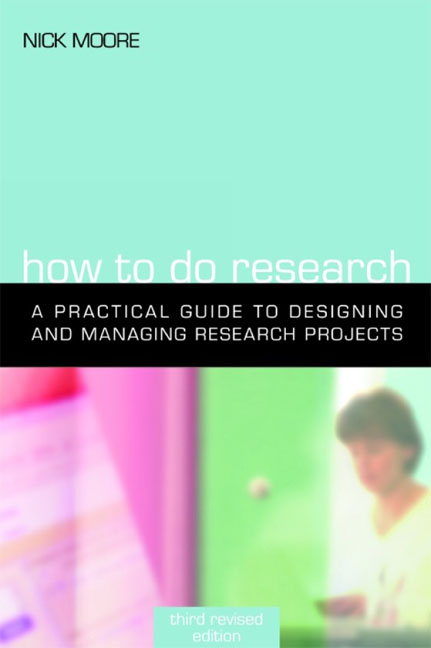Book contents
- Frontmatter
- Contents
- Acknowledgements
- Introduction: Types of research
- Part 1 The research process
- Part 2 Methods
- 9 Introducing research methods
- 10 Desk research
- 11 Analysing desk research
- 12 Collecting quantitative data
- 13 Analysing quantitative data
- 14 Collecting qualitative data
- 15 Analysing qualitative data
- 16 Sources of further reading
- Appendix The market for information professionals: A proposal from the Policy Studies Institute
- Index
10 - Desk research
from Part 2 - Methods
Published online by Cambridge University Press: 09 June 2018
- Frontmatter
- Contents
- Acknowledgements
- Introduction: Types of research
- Part 1 The research process
- Part 2 Methods
- 9 Introducing research methods
- 10 Desk research
- 11 Analysing desk research
- 12 Collecting quantitative data
- 13 Analysing quantitative data
- 14 Collecting qualitative data
- 15 Analysing qualitative data
- 16 Sources of further reading
- Appendix The market for information professionals: A proposal from the Policy Studies Institute
- Index
Summary
Not all research is about collecting new data – or primary data as it is known in the trade. A great deal can be achieved by working with data that have already been collected and processed by others. Indeed, most good research begins with a review of what has gone before. This type of research is often referred to as desk research.
Some projects are solely concerned with desk research, relying entirely on the re-analysis of other people's research or on secondary analysis of data that have been collected by others. Even the research that is based on the collection of primary data usually has an element of desk research built in. Few researchers, for example, feel able to manage without some form of literature review or contextual work to position their research.
Desk research covers a range of activities. Literature reviews are the most common. Increasingly the term ‘literature’ needs to be expanded to include material found on the internet. Closely allied to these reviews, and growing in importance, are research reviews which focus on the analysis of actual research findings from a number of different studies. There is also secondary analysis of data where the focus is firmly on the reworking of existing data sets to develop new insights into issues.
This chapter concentrates on the collection of the material used in desk research. The analytical techniques will be dealt with in Chapter 11.
Literature and internet searching
This is a very important part of nearly all research projects, yet it is something that is often dealt with superficially.
No research project exists in isolation. Each piece of work relates in some way to the environment within which the research takes place, to the theories and concepts that have been developed to explain the environmental conditions and to other research on the topic. If your work is to have coherence and relevance you should take full account of what has gone before and what is going on around you. You therefore need to make sure you are fully aware of all the relevant literature on the subject.
- Type
- Chapter
- Information
- How to Do ResearchA practical guide to designing and managing research projects, pp. 106 - 111Publisher: FacetPrint publication year: 2006



